Apple iOS 5 Review
by Vivek Gowri, Andrew Cunningham, Saumitra Bhagwat & Brian Klug on October 18, 2011 3:05 AM ESTiPhone 3G users may remember what using iOS 4.0 was like on those phones when it was first released - it reduced performance to the extent that fixing this slowness merited a bullet point during Apple's iOS 4.1 reveal, and we found that even that didn't fix all of the problems. Will iOS 5 make the older devices on the support list similarly slow, or can we upgrade without worrying?
iPhone 3GS and Third Generation iPod Touch
The iPhone 3GS came out just over two years ago, and while it's getting a little long in the tooth its performance under iOS 5 is pleasantly surprising. Generally speaking the 3GS seems to be running just as quickly as it did with iOS 4.3, and it’s missing just a handful of features included on higher-end devices: Location-based Reminders (on the 4 and 4S), WiFi Personal Hotspot (introduced for the Verizon iPhone 4 and extended to the GSM iPhone 4 in iOS 4.3, no doubt because the 3GS uses a BCM4325 for WiFi and the iPhone 4 uses a BCM4329), and Siri (an iPhone 4S exclusive) are among the most notable. 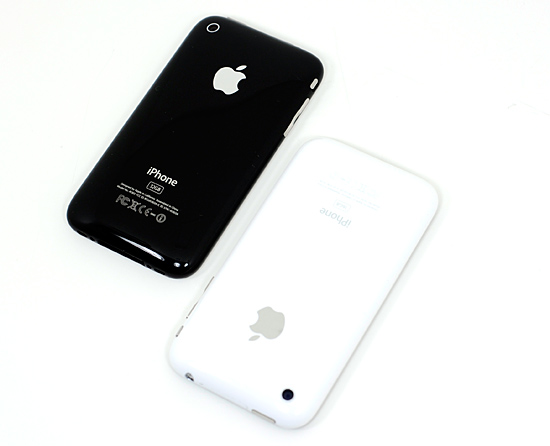
The big stuff is there, though, and it’s because the performance and feature gap between the 3GS and the rest of Apple’s lineup isn’t nearly as wide as the gap between the 3G and the then-current lineup at the time of iOS 4’s release. The 3GS’s Cortex A8 uses the same ARMv7 instruction set as the later A4 and A5 chips, while the 3G used the same ARMv6-capable Samsung S5L8900 SoC as the original iPhone. The 3GS has 256MB of RAM, the same as the original iPad and the currently-shipping fourth-gen iPod Touch, while the 3G had only 128MB. You get the picture - the 3GS’s upgrades relative to the 3G (which impressed us when the phone was originally released) has given it longer legs than its predecessor (and we’ll probably be saying similar things about the 4S in a couple of years).
We've already seen that JavaScript performance in Safari is better in iOS 5, but app launch times are another important metric. To get these numbers, we went back to our iOS 4.1 performance evaluation and repeated the same tests under the newer version. The phone was loaded with a fresh iOS 5 install, and all apps had been cleared from the multitasking tray. Our tests found that, most of the time, app launch speed was as fast or a bit faster than under iOS 4.1.
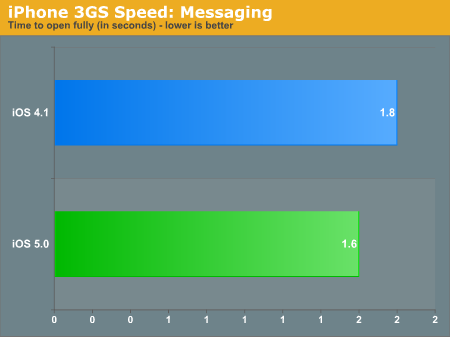
This is the time between when the Messages app was launched and when the app was ready for text entry. iOS 5 just edges out iOS 4.1 in this case.
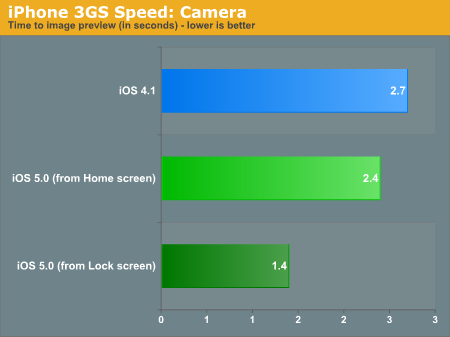
This is the time between when the Camera app was launched and when you could actually take pictures with it. From the Home screen, iOS 5 edges out iOS 4.1, and the time is consistently reduced by almost half when launched from the Lock screen - in order to reduce launch times, iOS 5 apparently does some preloading when the Home button is tapped twice (I also found this to be true on a fourth gen iPod Touch, though the difference was less pronounced).
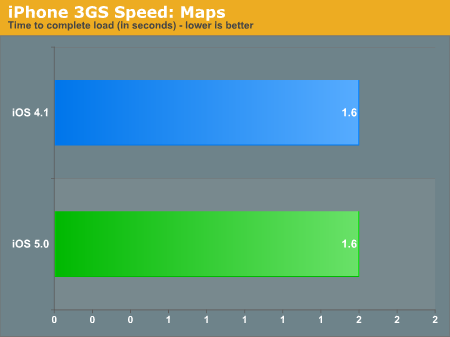
No changes here - the Maps app launches and is ready for input in the same amount of time as in iOS 4.1.
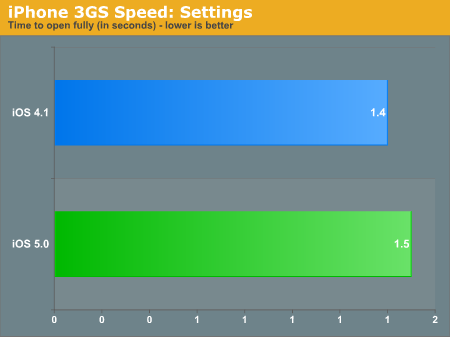
The Settings app launched slightly more slowly in iOS 5 than in iOS 4.1, but it's a change you'll notice only if you're timing it with a stopwatch.
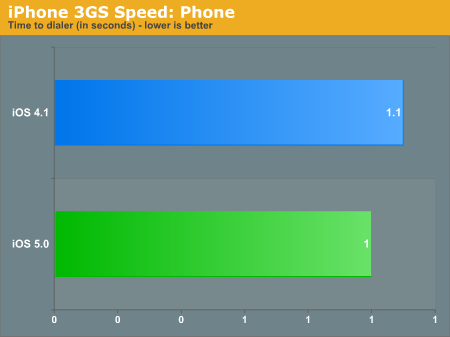
Another small variance from iOS 4.1 - in practice, the Phone dialer is ready to use pretty much instantaneously.
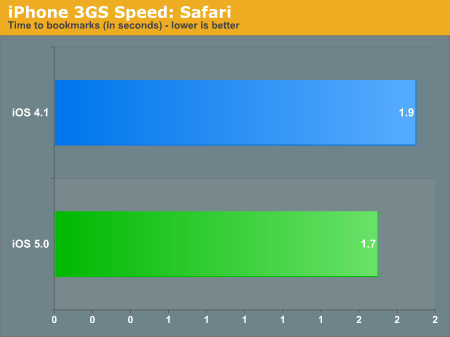
This is the amount of time between the launch of the Safari app and when the Bookmarks list popped up. iOS 5 brings a small improvement over iOS 4.1.
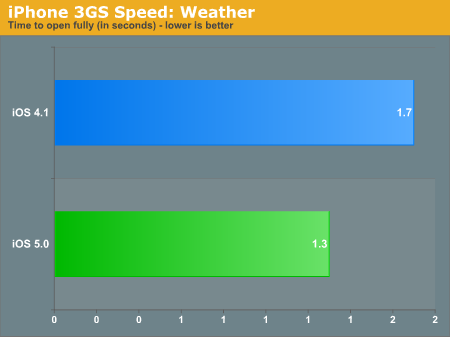
iOS 5 brings up Cupertino's weather marginally more quickly than in iOS 4.1.
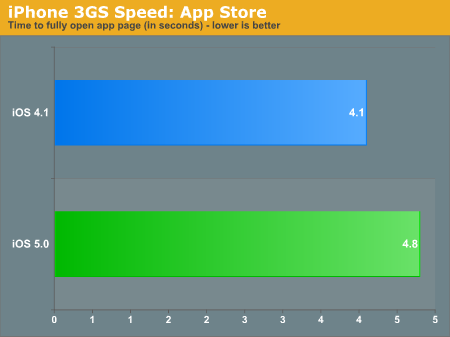
For this test, we looked up an app that had already been installed to the phone, closed the App Store, cleared it from the multitasking tray, re-opened the app, and waiting for the app's page to load again. It should be noted that while most other tests timed pretty consistently across multiple runs, we encountered the most variance between runs in this test - results were as low as 4.0 seconds and as high as 6.1 seconds. To get a reasonably representative number here, we did ten runs and averaged the results. The majority of the time, you're looking at a slight slowdown in the App Store compared to iOS 4.1.
If you've bought an iPhone 3GS since the iPhone 4 was introduced (or if you’re getting one for free now), you're not going to get burned the way that people who bought a 3G in the spring of 2010 did. The 3GS lacks the processing oomph of newer handsets, but is still mercifully responsive to user input. Apps launch quickly. Text entry is lag-free. The 3GS’s hardware and the extra time that Apple has had to optimize iOS 5 make upgrading easy to recommend, and the app launch and JavaScript benchmarks relative to iOS 4 back that up.
First generation iPad
The original iPad has the same Apple A4 SoC as the iPhone 4, but like the 3GS and third and fourth gen iPod Touches, it has only 256MB of memory. This doesn’t really hold it back though - iOS 5 seems to be pretty similar to iOS 4 from a hardware requirement standpoint, unlike the jump from iOS 3 to iOS 4.
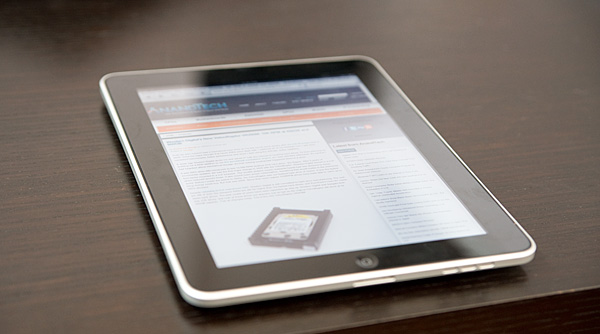
Basically everything that’s been updated in the iPad 2 version of iOS 5 makes the jump back to legacy; the notifications center, iMessage, iCloud, updated versions of Safari, Mail and Music, etc. Things that don’t make it include the camera and FaceTime updates (for obvious reasons), the new four-finger multitouch gestures (though other single finger swipe-based gestures still work), AirPlay mirroring (due to hardware requirements), and the ability to play 1080p video (also due to hardware requirements).
All of Apple’s devices running Cortex/ARM v7 processors are supported by iOS 5, and based on our findings with the iPhone 3GS and the original iPad, they’re more than capable of running it well.










86 Comments
View All Comments
lurker22 - Tuesday, October 18, 2011 - link
I disagree. Anecdotal reports better antennae reception in the 4s over the 4. Also the internals are almost completely different between the 4 and the 4s.Andrew Rockefeller - Tuesday, October 18, 2011 - link
...but then again, I come here for the info that I don't/can't get elsewhere. Is there really any need for yet another review on a spec bump? What magical new insight could be added to the dearth of info already available??http://lmgtfy.com/?q=iPhone+4S+review
uhuznaa - Tuesday, October 18, 2011 - link
Well, reliable comparisons of battery life and antenna performance would be good start.LordSojar - Tuesday, October 18, 2011 - link
It's the Android notification system we've had for years with a few minor tweaks. Wow, Apple sure is revolutionary.Why isn't Google suing them again? Oh right, because Google aren't a**holes... my bad.
uhuznaa - Tuesday, October 18, 2011 - link
I thought Android was "open" and even GPL/Apache licensed? Hard to sue anyone doing what the license allows them to do, really.lurker22 - Tuesday, October 18, 2011 - link
Oh please just stop already it's getting old.name99 - Thursday, October 20, 2011 - link
"Why isn't Google suing them again? Oh right, because Google aren't a**holes... my bad."Presumably because Google don't have a patent on the idea. Why not?
Maybe there is prior art? Maybe Google just didn't get a patent?
Either way, throwing out random statements as you are doing is not informative. The law has its flaws, but it's not just a popularity contest. If you have something useful to say about the legal issues go right ahead, but what you have said is not helpful, implying as it does that Google would never sue over patents. To take an example, if someone started copying pagerank or the adwords system, I expect Google would be suing them the next day.
Yann Bodson - Tuesday, October 18, 2011 - link
The music app new design is inspired by the old Braun vinyl players.http://www.wearesuperfamous.com/wp-content/3511586...
cjs150 - Tuesday, October 18, 2011 - link
There is a lot to admire about the new OS, and to be fair to Apple, the iPhone has been the class of the field since it first came out.Problem is that the field has raised their game. The rest of the field has no hang ups about making sure their phone works well with lots of software not just "Apple approved" products - particularly Microsoft products (I am not going to start on the Flash argument - lets just say it is an example of the closed universe that Apple wants).
Simple fact is the overwhelming majority of businesses run Microsoft products and in particular Outlook and exchange servers. If Anandtech cannot the iOS 5 calender to work with Outlook consistently what hope is there for the rest of us.
Great as a home phone, fantastic for kids. No better than B+ for business
More positively I really like the Apple philosphy of getting all their mobile products working the same way, there will be loads of people with mobile phones and iPads and an MP3 player of some sort. I would take issue with the idea that make OS upgrades "PC free" is a novel concept. The iPad 2 probably has more processing power than the office machine I used 7 years ago, so the concept that freeing updates from the PC is revolutionary is feeble. The real question is why did it take so long to achieve such an obvious step.
steven75 - Monday, October 31, 2011 - link
Funny because many of here at this Exchange shop use iPhones with our work email just fine, calendar and all. In fact, it works quite nicely.We have our choice of company phones and it's extremely rare for anyone to pick anything but an iPhone. I'm sure that would be different if it didn't play so nicely with Exchange.